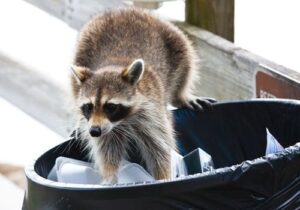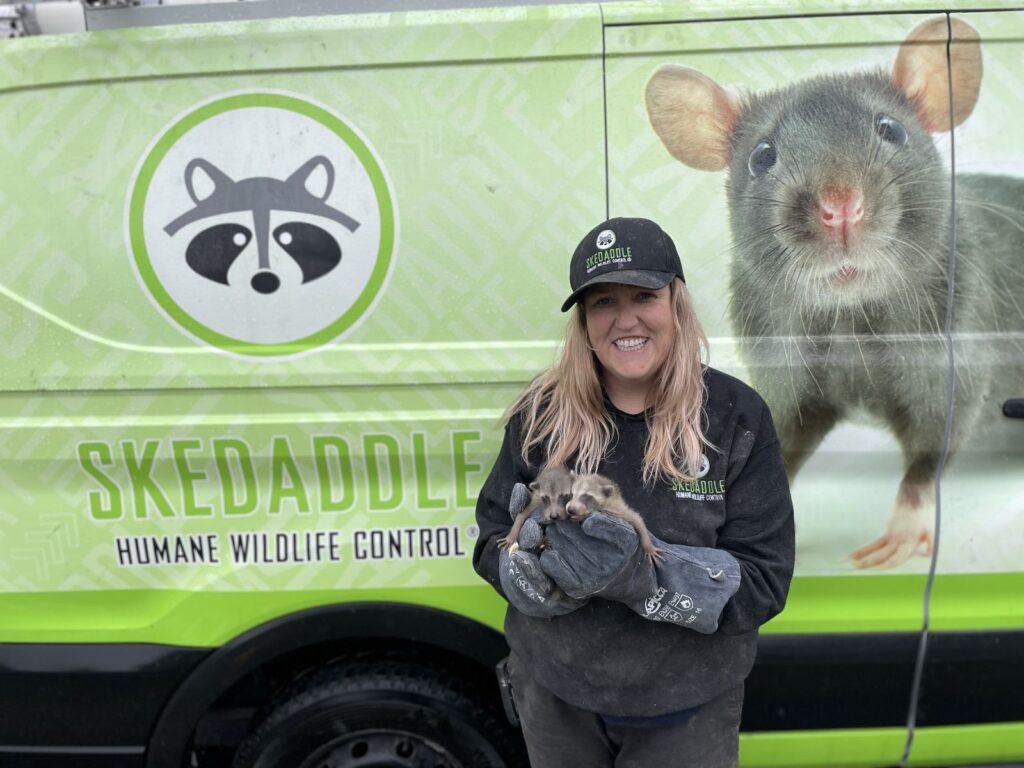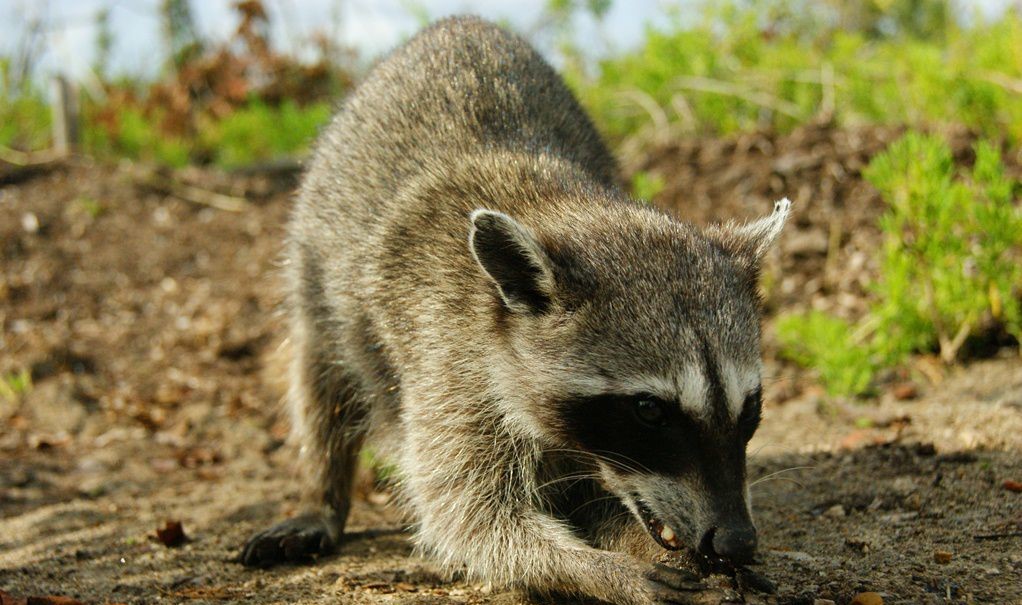Struggling with those pesky raccoons that have developed a rather unhealthy taste for your beautiful garden plants? Safeguarding your precious foliage from these naturally curious and resourceful creatures can be quite a challenge. From identifying a raccoon infestation to understanding the risks involved, we will guide you with actionable strategies to combat this common yet often overlooked nuisance.
Discover practical measures to protect your green paradise from these nocturnal invaders, especially professional assistance. Moreover, get insights into the benefits of selecting the right wildlife control specialist for your unique needs. So, let’s take a deep dive into this fascinating world of plant protection from prowling raccoons.
Remember the heart of your home’s outdoor landscape, your garden, deserves to remain a serene and inviolate habitat brimming with thriving plants — not be turned into a nightly feast station for raccoons!
Our Skedaddle wildlife team in Anoka County is ready to share valuable insights on safeguarding your garden from raccoons and preventing infestations. Trust us to help you keep those animals away!
What are the Common Signs of a Raccoon Infestation in a Garden?
If you’ve spent countless hours nurturing your garden, the last thing you want is for it to become a buffet for wildlife. Raccoons, in particular, can pose a significant threat to your beloved plants. To help stop this damage, we first need to accurately identify the signs of a raccoon infestation.
- Disturbances in Trash: Raccoons are opportunistic feeders, often rummaging through trash for food. If you notice your trash bins knocked over or trash spread across your yard, it’s a primary indication of raccoons in your vicinity. Implementing a secure system for your trash bins, such as locks or weighted lids, can help deter these curious creatures from creating further disturbances.
- Damaged Plants or Crops: These creatures love corn and watermelon among other garden plants. If you notice partially eaten crops or claw marks on fruits and vegetables, raccoons may be your culprits. In addition, raccoons are also known to dig holes in the ground as they forage for grubs and worms, leading to unsightly damage and disruption to your garden’s overall aesthetics.
- Nesting in the Garden: Raccoons often create dens in quiet, dark places. These unsuspecting hideaways can include your beautiful garden where they burrow, hiding under thick vegetation or even within hollowed out sections of trees. This can lead to extreme damage to your garden’s structure and ecosystem.
- Raccoon Tracks: The footprints of raccoons are distinctive, with five toes on both the front and back paws. Seeing these tracks in your garden is a sure sign of the raccoon’s presence. If you notice these tracks around your property, especially near your plants or trash bins, it’s essential to take action to protect your garden from potential damage.
Remember, these signs do not always guarantee a raccoon’s presence. They do, however, indicate a need for prompt investigation. Protecting your garden from raccoons involves timely detection and appropriate action.
What Potential Dangers Does a Raccoon Infestation Pose to a Garden?
You might think that raccoons are adorable creatures, but when it comes to your garden, they can spell significant trouble. Being nighttime scavengers, raccoons can cause extensive damage to gardens as they look for food. But what’s worse is the potential risks they bring, which extend far beyond the aesthetic damage to your plants.
Spread of Diseases
Raccoons are known carriers of various diseases, including rabies and leptospirosis. Their droppings can also contain parasitic roundworms that can cause serious illnesses in humans if inadvertently ingested. The mere presence of raccoons in your garden can put your family at risk.
Moreover, raccoons’ disruptive habits can spread these diseases throughout your yard. They are notorious for rummaging through trash bins and scattering refuse, which can easily lead to the spread of bacteria and parasites. Furthermore, opportunistic eaters may leave remnants of their meals, like unfinished fruits or prey carcasses, which can breed harmful bacteria. Thus, more than just a nuisance, a raccoon infestation can become a genuine health concern for you and your loved ones.
Structural Damage
Apart from your precious plants, raccoons can also be destructive to your home. In their quest for food and shelter, raccoons can gain access to your home by exploiting structural weaknesses. This can lead to costly repairs and even risks to your safety.
Their manipulative paws are quite adept at tearing apart roofing materials, gnawing on electrical wires, and inflicting serious damage to attic insulation. This can result in a series of problems, such as fire hazards, water leaks, and energy inefficiencies.
Upsetting the Garden Ecosystem
Raccoons don’t just eat plants. They can also prey on small animals that are essential for maintaining balance in your garden ecosystem. The loss of these helpful creatures like earthworms, insects, and small mammals can lead to a boom in pests that can harm your garden even more.
Furthermore, when raccoons upset the balance of your garden ecosystem, there could be severe consequences for plant health and productivity. For instance, a rise in pest populations, unchecked by predation, can result in the increased spread of plant diseases and the degradation of soil quality.
In conclusion, a raccoon infestation in your garden is not only a slight nuisance but a threat that should be taken seriously. The best way to ensure that your garden is safe from any wildlife threat, including raccoons, is to enlist professional help. Humane wildlife control is a surefire strategy to deal with this issue in a manner that’s harmless to the critters, protective of your garden, and safe for your family.

What are the Most Effective Methods to Protect Garden Plants from Raccoons?
It’s no secret that raccoons are intelligent and highly capable. They are notorious for their ability to overcome obstacles and infiltrate secure areas. Your garden, ripe with enticing plants and potential food, could become the next target. However, there are several methods you can employ to deter these agile garden invaders.
Secure Your Trash Bins
Begin by securing your trash bins. Raccoons are drawn to the smell of leftover food and if your bins are an easy target, your garden becomes a tempting area of exploration. By securing your trash bins, you will help to reduce the chances of raccoons being attracted to your property.
Use of Natural Repellents
Another tactic is to use natural raccoon deterrents. Raccoons detest the smell of certain substances, such as hot pepper, onion, and garlic. A homemade spray consisting of these elements can discourage them from entering your garden. Please ensure proper care while using this concoction, as direct contact can irritate the skin and eyes of both raccoons and humans.
Implement Fencing
Though raccoons are natural climbers, a well-constructed fence can provide a significant deterrent. Add a topper that tilts outward to prevent them from climbing over. Remember to regularly inspect your fences for any signs of damage or climbing attempts. Not all fences are raccoon-proof, so it’s essential to choose materials and designs that are difficult for the clever pests to defeat.
Deploying Motion-Activated Sprinklers
You can then consider installing motion-activated sprinklers. The surprise element can scare off raccoons, making them think twice before taking another step on your property.
While these tactics may aid you in protecting your garden, it’s paramount to remember that removal and exclusion efforts should be humane and ethical. This is where our humane wildlife removal Anoka County shines. We believe in removing raccoons most respectfully, without causing unnecessary stress or harm to the animal.
How Does a Wildlife Control Technician Contribute to the Process of Raccoon Removal?
While homeowner efforts can indeed help deter raccoons, sometimes, extermination is necessary. This is where the expertise of a professional wildlife control technician comes into play.
A wildlife control technician is trained to intercept, capture, and safely remove raccoons from your premises. They use time-tested strategies combined with modern technology to offer a humane solution. Moreover, technicians are well aware of state and local regulations surrounding wildlife control, ensuring that your actions remain within legal boundaries.
Tracking and Identification
In the initial stages, we conduct a thorough inspection of your property to identify signs indicative of a raccoon intrusion. We search for tracks, noises, and signs of nesting. Health and safety are our priorities; hence, our technicians wear protective gear to avoid any potential harm.
Humane Trapping
With our expertise, we set up and monitor humane traps designed to catch raccoons without causing any harm. We understand that raccoons are part of our ecosystem and deserve respect and kindness. Therefore, our eradication strategies guarantee the safe and humane treatment of these creatures.
Removing Attractants
We help in identifying and removing factors that attract raccoons to your garden. This may include sealing off trash bins, eliminating food sources, or removing features like bird feeders that may attract these nocturnal critters.
Post-Removal Care
After ensuring the removal of raccoons, we conduct a follow-up inspection to guarantee there is no recurring issue. This involves checking for signs of re-entry, structural vulnerabilities, and advising homeowners on preventive measures. We also provide cleaning and sterilization services to eliminate any hazardous waste left behind by the raccoons.
Our professional services go beyond temporary fixes – we aim for sustainable solutions that prevent future infestations.

Why Choose Us for your Wildlife Removal Needs?
We at Skedaddle Humane Wildlife Control in Anoka County provide comprehensive humane wildlife control solutions. Our raccoon removal strategies are designed to address your specific needs and circumstances. We believe in humane treatment and the preservation of wildlife, thus, our methods are ethical, effective, and backed by years of professional experience.
If you’re dealing with raccoon trouble in your garden, don’t hesitate to reach out to us. Feel free to contact us to request a quote and learn more about our services. Together, we can make your green space safe and enjoyable again.



